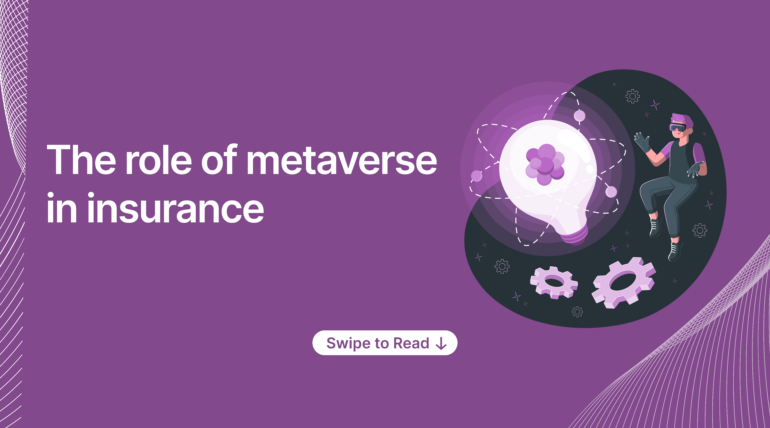
We all know insurance is the backbone of security – from business ventures to personal health and the legacy we leave behind.
But, let us face it, the world of insurance can be a maze of jargon and confusion.
In a time where every second counts and choices are limitless, the insurance industry is undergoing a transformative journey, leveraging innovative technology to simplify processes and enhance customer experiences, our blog highlights the exciting transformation happening in the insurance realm.
Discover how insurance chatbots have evolved beyond mere conveniences, becoming trusted advisors in the complex realm of insurance. Let’s explore how chatbots are not just streamlining operations but resharing customer service in the insurance sector.
What is an insurance chatbot?
An insurance chatbot, whether rule-based or AI-driven, serves as a virtual assistant bridging the communication gap between insurance companies and their customers.
Rule-based counterparts initiate conversations, offer support, and process requests based on predetermined rules set by agents. They follow mapped-out workflows for common scenarios, making them adept at resolving simpler issues but limited in their capabilities compared to their AI counterparts.
AI-driven insurance chatbots, on the other hand, elevate the game by simulating human-like conversations and independently processing requests. Trained to understand user intent and handle queries not explicitly defined, these bots offer a broader range of functionalities compared to rule-based counterparts.
To realize their full potential, AI chatbots undergo training to learn keywords, synonyms, recognize FAQs, and grasp customer intent. Fortunately, the learning curve is swift, enabling quick deployment.
When integrated with advanced insurance technology, AI chatbots become invaluable assets, seamlessly contributing to underwriting, customer support, fraud detection, and various other facets of insurance operations.
Benefits of using an insurance chatbot
1. 24/7 customer support
Insurance chatbots offer unparalleled accessibility, providing round-the-clock customer support. Unlike human agents, they don’t need breaks or sleep, ensuring immediate assistance at any time. This constant availability enhances customer satisfaction, offering a reliable communication channel, especially for urgent queries beyond regular business hours.
2. Easy claims processing and settlement
Simplifying the traditionally complex claims process, chatbots guide customers through filing claims, offering status updates, and addressing related queries. This not only accelerates the settlement process but also reduces errors, creating a smoother experience for customers and enhancing efficiency for the company.
3. Enhanced security
In an industry where confidentiality is crucial, chatbots provide an extra layer of security. Advanced chatbots, particularly those powered by AI, handle sensitive customer data securely, ensuring compliance with data protection regulations. By automating data processing tasks, chatbots minimize human intervention, mitigating the risk of data breaches.
4. Multilingual support
Modern insurance chatbots excel in breaking language barriers by communicating in multiple languages. This capability allows insurance companies to cater to a diverse customer base, expanding their market reach and eliminating the need for multilingual staff, thereby reducing operational costs.
5. Cost reduction
Deploying chatbots leads to substantial cost savings by automating routine inquiries and tasks. This efficiency allows human agents to focus on more complex issues, optimizing resource allocation and potentially saving businesses up to 30% on customer support expenses.
6. Boosting agent productivity
Chatbots take on mundane, repetitive tasks, enabling human agents to concentrate on solving intricate problems. This delegation increases overall productivity as agents can dedicate more time and resources to tasks that require human expertise and empathy, ultimately enhancing the quality of service.
7. Engaged and satisfied customers
Chatbots contribute to higher customer engagement by providing prompt responses. Integration with CRM systems equips chatbots with detailed customer insights, enabling them to offer personalized assistance and enhancing the overall customer experience.
8. Effective lead generation
Insurance chatbots serve as excellent tools for lead generation without pressuring potential customers. By incorporating contact forms and engaging in informative conversations, chatbots can effectively capture leads and initiate the customer journey. The result is not just streamlined processes but a transformative customer interaction that propels the insurance industry into a new era of efficiency and engagement.
How can insurance companies use insurance chatbots

1. Customer education and FAQs
Chatbots, armed with natural language processing (NLP), educate customers on products and policies. By uploading informative documents, they offer seamless, personalized responses to FAQs. For more complex queries, chatbots smoothly guide customers to connect with live agents.
2. Onboarding new customers
Chatbots play a pivotal role in guiding new customers through onboarding. From answering policy queries to facilitating enrollment in wellness programs, they ensure a smooth onboarding experience. Embracing omnichannel service, chatbots enable seamless communication across various channels.
3. Cross-selling and upselling
Leveraging customer data, chatbots predict and recommend tailored insurance policies. Through interactive conversations, chatbots create opportunities to cross-sell and upsell additional products, enhancing the probability of successful sales.
4. Claim management
Chatbots simplify claim processing by handling paperwork, guiding policyholders through claim filing, and automating the initiation of the claim process. By assessing insurance types and verifying damage through image recognition, chatbots expedite the entire claim management process.
5. Fraud detection
Chatbots, equipped with AI technology, review claims and subject them to fraud detection algorithms before processing. This proactive approach enhances security, protects against fraudulent attempts, and ensures the integrity of the claims settlement process.
6: Enhancing insurance agents
Contrary to misconceptions, chatbots enhance the efficiency of insurance professionals. By automating routine tasks, chatbots enable agents to focus on addressing complex customer issues and fostering meaningful interactions. They also enrich agent-customer interactions by gathering data on customer intent, requirements, and risk profiles, providing agents with valuable context for more personalized service. In essence, insurance chatbots are strategic partners, enhancing the overall efficiency of insurance operations
Future of insurance chatbots
As technology continues to evolve, the future of insurance chatbots promises even more innovation and efficiency. Advanced AI capabilities will enhance personalization, allowing chatbots to understand and respond to customer needs with unprecedented accuracy. Integration with emerging technologies like blockchain may revolutionize data security and streamline claims processing. The role of insurance chatbots will extend beyond customer service, becoming integral in risk assessment, underwriting, and strategic decision-making. The dynamic landscape of InsurTech ensures that chatbots will play a central role in shaping the future of the insurance industry.
Conclusion
In a rapidly evolving insurance landscape, embracing AI-powered chatbots isn’t just a choice; it’s a necessity. These digital assistants not only streamline operations but redefine customer interactions, ensuring a future where insurance is not just a service but a personalized and efficient experience. As technology propels the industry forward, the collaboration between insurers and chatbots will continue to evolve, creating a a landscape where innovation meets customer-centricity, making the future of insurance brighter and more accessible for all.







